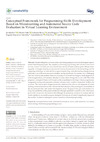Please use this identifier to cite or link to this item:
https://accedacris.ulpgc.es/jspui/handle/10553/106727
| Title: | Conceptual framework for programming skills development based on microlearning and automated source code evaluation in virtual learning environment | Authors: | Skalka, Jan Drlik, Martin Benko, Lubomir Kapusta, Jozef Rodríguez Del Pino, Juan Carlos Smyrnova-Trybulska, Eugenia Stolinska, Anna Svec, Peter Turcinek, Pavel |
UNESCO Clasification: | 120310 Enseñanza con ayuda de ordenador 120324 Teoría de la programación |
Keywords: | Automated assessment Conceptual framework Introductory programming courses Microlearning Source code automatic evaluation |
Issue Date: | 2021 | Journal: | Sustainability (Switzerland) | Abstract: | Understanding how software works and writing a program are currently frequent requirements when hiring employees. The complexity of learning programming often results in educational failures, student frustration and lack of motivation, because different students prefer different learning paths. Although e-learning courses have led to many improvements in the methodology and the supporting technology for more effective programming learning, misunderstanding of programming principles is one of the main reasons for students leaving school early. Universities face a challenging task: how to harmonise students’ education, focusing on advanced knowledge in the development of software applications, with students’ education in cases where writing code is a new skill. The article proposes a conceptual framework focused on the comprehensive training of future programmers using microlearning and automatic evaluation of source codes to achieve immediate feedback for students. This framework is designed to involve students in the software development of virtual learning environment software that will provide their education, thus ensuring the sustainability of the environment in line with modern development trends. The paper’s final part is devoted to veri-fying the contribution of the presented elements through quantitative research on the introductory parts of the framework. It turned out that although the application of interactive features did not lead to significant measurable progress during the first semester of study, it significantly improved the results of students in subsequent courses focused on advanced programming. | URI: | https://accedacris.ulpgc.es/handle/10553/106727 | ISSN: | 2071-1050 | DOI: | 10.3390/su13063293 | Source: | Sustainability (Switzerland) [EISSN 2071-1050], v. 13 (6), (Marzo 2021) |
| Appears in Collections: | Artículos |
SCOPUSTM
Citations
36
checked on Jun 8, 2025
WEB OF SCIENCETM
Citations
24
checked on Feb 22, 2026
Page view(s)
57
checked on Jan 11, 2026
Download(s)
58
checked on Jan 11, 2026
Google ScholarTM
Check
Altmetric
Share
Export metadata
Items in accedaCRIS are protected by copyright, with all rights reserved, unless otherwise indicated.
